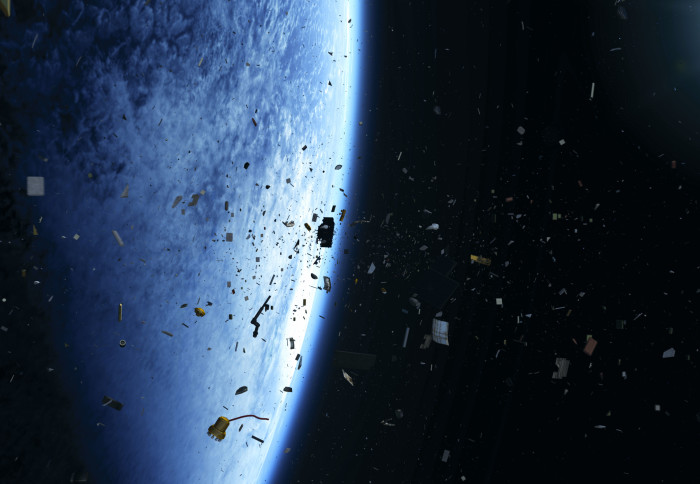Imperial academics awarded funding for space sustainability research
by Ayesha Khan

ESA/Spacejunk3D, LLC
Aeronautics academics receive funding from the UK Space Agency for research into removing dangerous debris in space.
The UK Space Agency recently announced funding for new projects that will help to support sustainable space operations. All projects focus on the development of AI-based tools that will allow for the detection of space debris, autonomous action to avoid collisions and removal of debris for disposal.
With approximately 330 million pieces of debris in space, orbital congestion is a major challenge for the space sector. Debris such as old satellites, spent rocket bodies and tools dropped by astronauts can stay in orbit for hundreds of years. This presents substantial danger to new satellites being launched and so debris mitigation and removal is vital for long-term space sustainability.
Aeronautics academics, Dr Matthew Santer and Dr Davide Amato are leading on Imperial’s contribution to two projects.
Davide’s project will use advanced uncertainty quantification methods to help operators manage traffic in orbit and avoid collisions between satellites and space debris. An AI-based computational framework will allow researchers to accurately predict the position of space objects, from radar observations, and assist to make informed decisions about whether to perform a collision avoidance manoeuvre or schedule a new radar observation.
This work is vital to ensuring the sustainability of human activities in space and we are excited to contribute to the UK’s activities in this area. Dr Matthew Santer Reader in Aerospace Structures
Mathew’s research will focus on modelling and simulation of the deformation and fragmentation of space debris, especially joints and hinges of spacecraft. The project will develop accurate models to predict structural failure of primary joints and hinges on satellites subject to high aero-, thermo- and flight dynamic loads. Models and tools developed will then be integrated into an existing open-source framework for analysis of atmospheric re-entry.
Both projects are being undertaken in collaboration with the University of Strathclyde and D-Orbit UK. In speaking about the work being undertaken Davide noted the opportunity the funding has provided, “I’m excited to work towards ensuring safe and sustainable operations in space.”
The UK’s National Space Strategy acknowledges the need to the UK to lead in ensuring that space is both safe and sustainable. This support is received from a joint call from the UK Space Agency’s Space Surveillance and Tracking and National Space Technology Programme.
Article text (excluding photos or graphics) © Imperial College London.
Photos and graphics subject to third party copyright used with permission or © Imperial College London.
Reporter
Ayesha Khan
Department of Aeronautics